PRINCETON, NJ -- U.S. small-business owners are more optimistic now than at any time since late 2008. The Wells Fargo/Gallup Small Business Index improved to +25 in July, from +16 in the second quarter. The latest result, while not as high as pre-recession levels, is the highest index score since the third quarter of 2008.
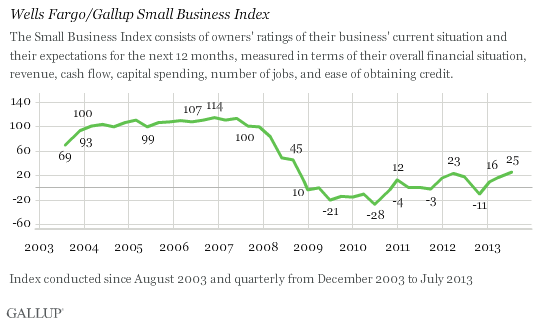
Prior to the recession and financial crisis of 2008-2009, Small Business Index scores were generally in the triple digits. The Wells Fargo/Gallup Small Business Index was initiated in August 2003, reached its peak at 114 in December 2006, and hit its low point of -28 in July 2010.
The latest results are based on a national random sample of 603 small-business owners having $20 million or less of sales or revenues, conducted July 22-26.
Owners' Higher Optimism Due More to Future Outlook
The increase in the overall index score comes more from owners' improving future outlook than from their views of present conditions.
Small-business owners' ratings of their current operating environment are mostly flat compared with April. The Present Situation Dimension of the index was +4 in July, essentially the same as the +2 in the previous quarter. But, this is only the second time the Present Situation Dimension has been in positive -- if still broadly neutral -- territory since December 2008.
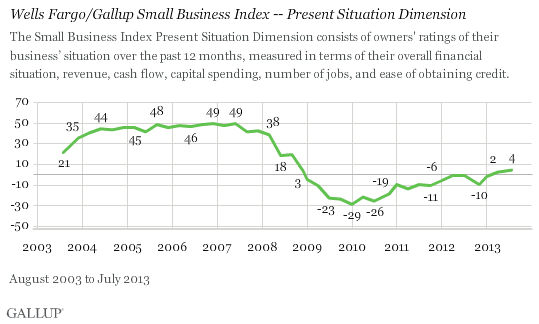
The Future Expectations Dimension of the index, which measures owners' expectations for their business' operating environment over the next 12 months, increased to +21 in July, up from +14 in April. Small-business owners are modestly more optimistic about their future operating environment compared with one year ago, when this dimension stood at +18.
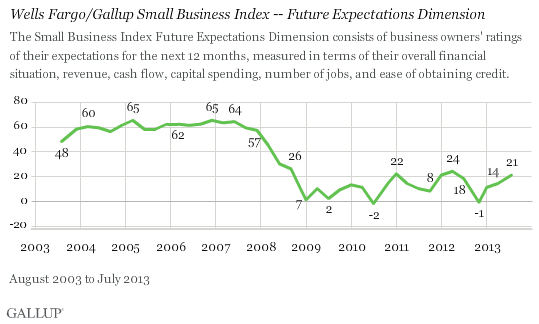
Perceptions About Credit Availability Pushing Index Score Up
Small-business owners' increased overall optimism correlates with their more positive views toward the ease of obtaining credit. Fewer business owners say they have experienced difficulty in the last 12 months obtaining credit, at 25%, than did so last quarter, at 30%.
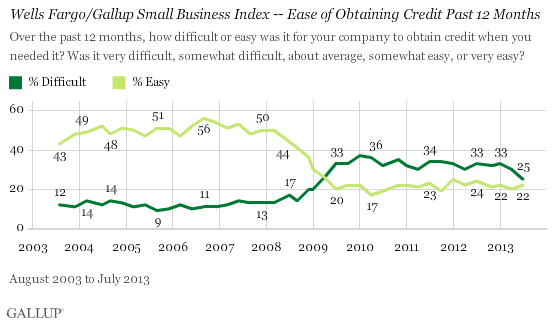
Thirty percent of small-business owners say they expect credit to be difficult to obtain in the next 12 months -- down significantly from the 36% recorded last quarter, and the lowest percentage reported since 2008.
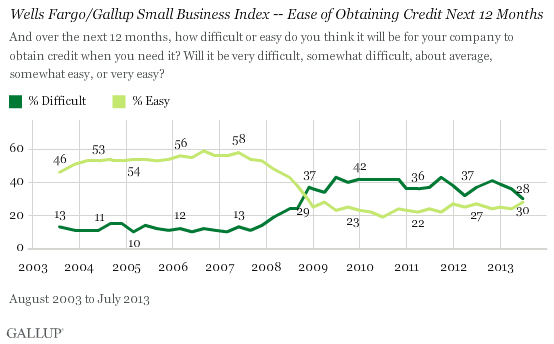
Implications
Small-business owners are more optimistic than they have been since late 2008. This higher optimism is due more to what they expect in the future than what they are experiencing in the present, and also is related to increased views about the ease of obtaining credit. Still, the overall level of the index remains well below where it was in the years prior to the 2008 recession.
During recent weeks, Gallup data have shown that Americans' economic confidence is down slightly from the peaks reached in May and June, and in the early months of the year. Gallup's measure of job creation was quite stable in July.
Gallup's measurement of consumer spending has been up in recent weeks, which in turn could have a positive impact on many small businesses across the country.
About the Wells Fargo/Gallup Small Business Index
Since August 2003, the Wells Fargo/Gallup Small Business Index has surveyed small-business owners on current and future perceptions of their business financial situations. Visit the Wells Fargo Business Insight Resource Center to access the full survey report and to listen to Wells Fargo's quarterly Small Business Index podcast.
Survey Methods
Results for the total dataset are based on telephone interviews with 603 small-business owners, conducted July 22-26, 2013. For results based on the total sample of small-business owners, one can say with 95% confidence that the maximum margin of sampling error is ±4 percentage points.
Sampling is done on a random-digit-dial basis using sampling of small businesses having $20 million or less of sales or revenues. The data are weighted to be representative of U.S. small businesses within this size range nationwide.
In addition to sampling error, question wording and practical difficulties in conducting surveys can introduce error or bias into the findings of public opinion polls.
For more details on Gallup's polling methodology, visit www.gallup.com.
